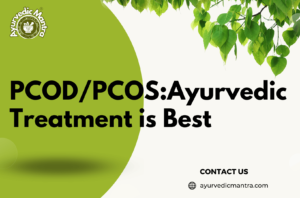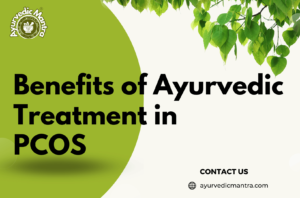
PCOD/PCOS: Ayurvedic Treatment is Best
Introduction Polycystic Ovary Disorder (PCOD) or Polycystic Ovary Syndrome (PCOS) is a common endocrine disorder affecting millions of women worldwide. It leads to hormonal imbalances,


If you’ve ever experienced unexplained weight gain, fatigue, or changes in your mood, you might have wondered if hypothyroidism is the culprit. Hypothyroidism is expected when the thyroid gland fails to produce enough thyroid hormones, leading to various health issues. In this article, we’ll delve into the top five questions about how hypothyroidism occurs, providing you with comprehensive insights better to understand this condition and its impact on your health.
Hypothyroidism is a thyroid disorder characterized by an underactive thyroid gland. The thyroid gland in the neck is responsible for producing hormones that regulate the body’s metabolism, energy levels, and other vital functions. When the thyroid gland doesn’t have enough thyroid hormones (thyroxine and triiodothyronine), it can slow down bodily processes, affecting overall health and well-being.
The causes of hypothyroidism can be diverse. One of the most common reasons is an autoimmune condition called Hashimoto’s thyroiditis, where the body’s immune system mistakenly attacks the thyroid gland, causing inflammation and impairing hormone production. Other causes include iodine deficiency, certain medications, radiation therapy to the neck area, and congenital issues. Understanding the underlying cause is crucial in determining the appropriate treatment for each individual.
Hypothyroidism can affect people of all ages and genders, but some individuals are at a higher risk than others. Women, especially those over 60, are more prone to developing hypothyroidism. Additionally, individuals with a family history of thyroid disorders or autoimmune diseases may have an increased risk. People with previous thyroid surgery or radiation therapy in the neck area should also be vigilant about monitoring their thyroid function.
Recognizing the symptoms of hypothyroidism is essential for early detection and proper management of the condition. Some of the most common symptoms include:
It’s important to note that symptoms can vary from person to person, and some individuals may experience subtle signs that can easily be overlooked.
Diagnosing hypothyroidism typically involves a combination of medical history assessment, physical examination, and blood tests to measure thyroid hormone levels. The primary treatment for hypothyroidism involves hormone replacement therapy. Synthetic thyroid hormones, such as levothyroxine, are prescribed to supplement the body’s inadequate hormone production. Regular monitoring and adjustments to the medication dosage may be necessary to ensure optimal thyroid hormone levels.
In conclusion, hypothyroidism is a prevalent condition due to an underactive thyroid gland and insufficient production of thyroid hormones. It can affect individuals of all ages and genders, but certain factors may increase the risk. Recognizing the common symptoms and seeking an early diagnosis is crucial for effective management. With appropriate medical intervention and lifestyle adjustments, individuals with hypothyroidism can lead fulfilling lives and mitigate the impact of this condition on their overall health and well-being.
Remember, if you suspect you may have hypothyroidism or experience any concerning symptoms, you must consult a healthcare professional promptly for accurate diagnosis and personalized treatment. Stay informed, care for your health, and prioritize well-being.
FAQs about Hypothyroidism
Hypothyroidism is a thyroid disorder characterized by an underactive thyroid gland, resulting in insufficient production of thyroid hormones. The thyroid gland regulates various bodily functions, including metabolism, energy levels, and temperature. When the thyroid gland fails to produce enough hormones (thyroxine and triiodothyronine), the body’s metabolism slows down, leading to various health issues. Hypothyroidism can occur due to multiple factors, including autoimmune conditions like Hashimoto’s thyroiditis, iodine deficiency, radiation therapy to the neck area, certain medications, and congenital abnormalities.
Hypothyroidism manifests with many symptoms, which can vary from person to person. Common signs include persistent fatigue, unexplained weight gain, dry and coarse skin, hair loss, sensitivity to cold, muscle aches, joint pain, mood swings, depression, forgetfulness, and difficulty concentrating. In some cases, individuals may also experience constipation, elevated cholesterol levels, and changes in their menstrual cycle.
Hypothyroidism can affect people of all ages and genders, but certain factors may increase the risk. Women, especially those over 60, are more prone to developing hypothyroidism. Additionally, individuals with a family history of thyroid disorders or autoimmune diseases are at higher risk. Those who have undergone previous thyroid surgery or radiation therapy in the neck area should also be vigilant about monitoring their thyroid function.
Diagnosing hypothyroidism typically involves a combination of medical history assessment, physical examination, and blood tests. A healthcare professional will evaluate symptoms, conduct a physical exam, and order blood tests to measure thyroid hormone levels. The most common blood tests include TSH (thyroid-stimulating hormone), free T4 (thyroxine), and free T3 (triiodothyronine) levels. These tests help determine the severity of the condition and guide the appropriate treatment.
If left untreated, hypothyroidism can lead to several complications. The slow metabolism associated with the condition can result in weight gain and difficulty losing weight. It can also affect heart health, increasing the risk of high cholesterol and heart disease. Additionally, untreated hypothyroidism may impact fertility, menstrual irregularities, and pregnancy outcomes. Mental health can be affected, too, leading to symptoms like depression and anxiety. It’s crucial to seek medical attention promptly to prevent or manage these potential complications.
The primary treatment for hypothyroidism involves hormone replacement therapy. Synthetic thyroid hormones, such as levothyroxine, are prescribed to supplement the body’s inadequate hormone production. Levothyroxine is typically taken orally once a day and helps restore thyroid hormone levels to normal. Regular monitoring of thyroid hormone levels is necessary to adjust the medication dosage, ensuring optimal hormone balance.
Adopting specific lifestyle changes can complement medical treatment and improve overall well-being. A balanced diet rich in nutrients, regular exercise, and sufficient sleep can contribute to better management of hypothyroidism. Reducing stress levels and avoiding smoking and excessive alcohol consumption may also be beneficial. Following the healthcare professional’s advice and treatment plan is essential while incorporating healthy habits into daily life.
Hypothyroidism is a chronic condition that typically requires lifelong management. However, with appropriate medical intervention, lifestyle adjustments, and regular monitoring, individuals with hypothyroidism can lead fulfilling lives and effectively mitigate the condition’s impact on their health and well-being.
Yes, some symptoms of hypothyroidism can overlap with other medical conditions, leading to potential confusion during diagnosis. Conditions like depression, chronic fatigue syndrome, and fibromyalgia share similarities with hypothyroidism, making it crucial for healthcare professionals to conduct thorough evaluations and perform relevant tests to arrive at an accurate diagnosis.
While some individuals may explore natural remedies or alternative therapies, it’s essential to remember that the primary treatment for hypothyroidism involves hormone replacement therapy. Natural remedies, such as dietary supplements, herbs, and yoga, may offer supportive benefits but should not replace conventional medical treatment. Always consult a healthcare professional before incorporating alternative therapies into your treatment plan.

Introduction Polycystic Ovary Disorder (PCOD) or Polycystic Ovary Syndrome (PCOS) is a common endocrine disorder affecting millions of women worldwide. It leads to hormonal imbalances,

Introduction Losing weight is a journey that requires dedication, consistency, and self-care. While there are numerous weight loss techniques out there, not all of them

Polycystic Ovary Syndrome (PCOS) is a hormonal disorder that affects millions of women worldwide. It can lead to various health complications, such as irregular periods,

In recent years, Ayurveda, an ancient system of natural healing originating from India, has gained significant popularity as an alternative approach to treating various health

आजकल वजन बढ़ने और चर्बी की वृद्धि होने की समस्या एक आम समस्या बन गई है। बढ़ते वजन और अतिरिक्त चर्बी के कारण न केवल

प्रस्तावना: आजकल वजन बढ़ने और ओबेसिटी की समस्या एक आम समस्या बन गई है। बढ़ते वजन के कारण न केवल शारीरिक समस्याएं होती हैं, बल्कि
